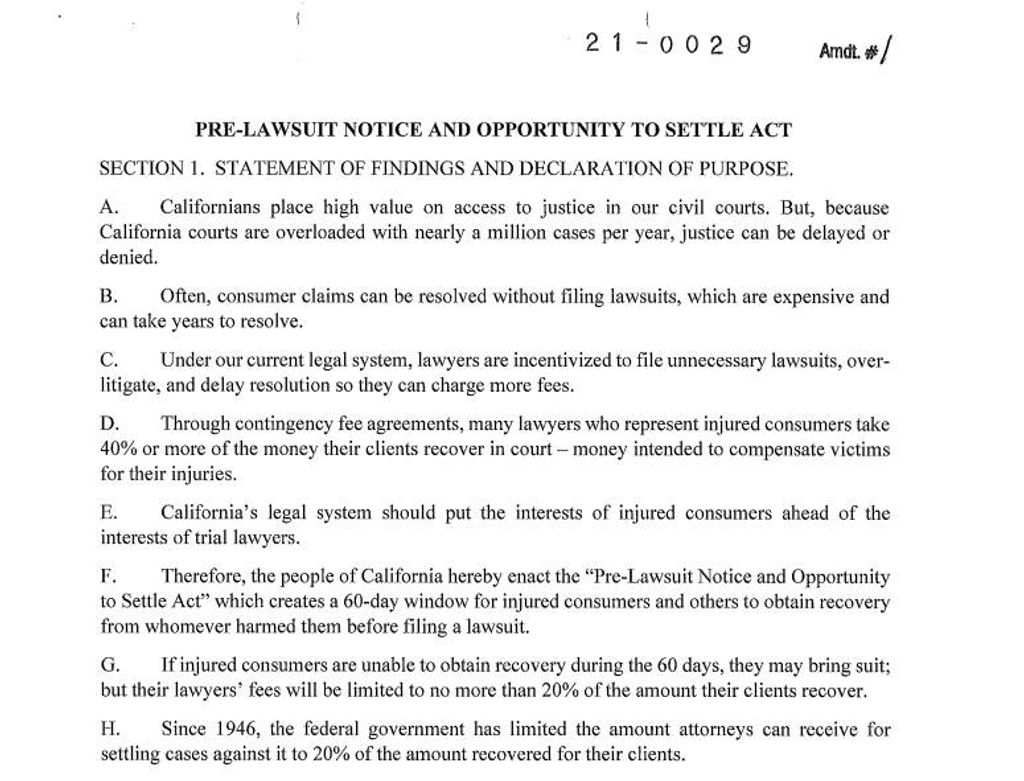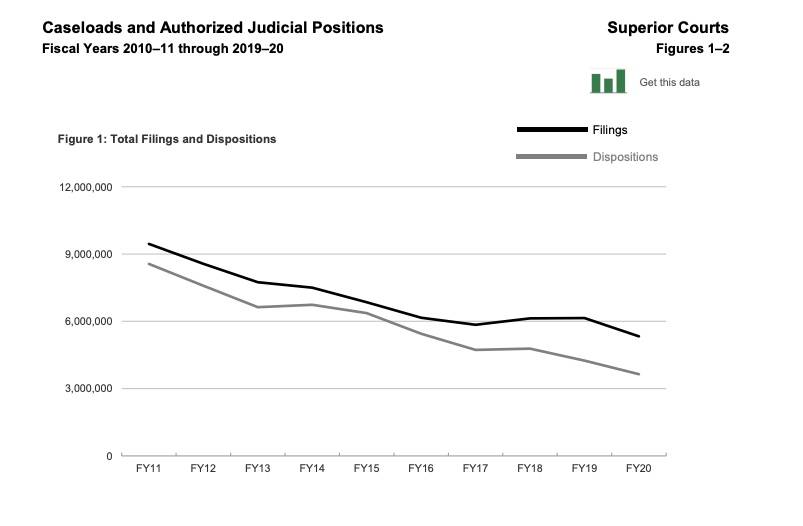
Understanding the Pre-Lawsuit Notice and Opportunity to Settle Act
 By Daniel Amos
By Daniel Amos This is the second article in a series about some important ballot initiatives that may have a significant impact on consumers of legal services. Our first article was about the Consumer Legal Fee Protection Act. This article will cover the Pre-Lawsuit Notice and Opportunity to Settle Act.
What is the “Pre-Lawsuit Notice and Opportunity to Settle Act”?
The Pre-Lawsuit Notice and Opportunity to Settle Act (Initiative 21-0029) states that it “...creates a 60-day window for injured consumers and others to obtain recovery from whoever harmed them before filing a lawsuit.” The measure goes on to state that if the injured consumer is unable to obtain recovery during those 60 days, they may bring suit, but their lawyers’ fees will be limited to no more than 20% of the amount their client recovers.
Who is in favor of the Pre-Lawsuit Notice and Opportunity to Settle Act?
The Civil Justice Association of California (CJAC), previously named the “Association for California Tort Reform” is the organization that has submitted the initiative. The CJAC describes itself as an organization “dedicated solely to improving California’s civil liability system, in the legislature, the regulatory arena, and the courts. Our membership base consists of businesses and associations from a broad cross-section of California industries.” According to those in opposition, the money behind this initiative is coming from many of the same big businesses that have bankrolled these types of ballot initiatives before, including ExxonMobile, Chevron, State Farm, Allstate, and Farmers Insurance companies. Money backing the initiative also comes from companies not as well known to the general public such as Yourcause LLC, a software company that claims to “empower and connect people to drive impact for social good”. A list of businesses and industries backing the initiative can be found here: CAOCIDPAC.
Who is against the Pre-Lawsuit Notice and Opportunity to Settle Act?
On the consumer’s side, fighting against this initiative are the Consumer Attorneys of California (CAOC). The CAOC describes itself on its website as an “organization that represents the interests of 39 million Californians. Our member attorneys stand for plaintiffs seeking accountability from those who do wrong.”
It is believed the money to fight the initiative comes in large part from the consumer attorneys (plaintiff lawyers) who represent people “injured or killed by defective products or drugs; people who suffer discrimination because of age, gender, disability or race; and individuals injured or killed because of another's negligent acts, and citizens whose civil rights have been violated.” We are attempting to confirm this.
What is the current status of the Pre-Lawsuit Notice and Opportunity to Settle Act?
California Attorney General Rob Bonta has released the title and ballot summary for the initiative which will appear on petitions that will be circulated throughout California for signature gathering. If the initiative qualifies for the ballot, the title and summary will then also be proposed for the ballot. According to the CAOCIDPAC, the CJAC has built a campaign war chest, with $660,000 in total contributions so far in support funding for the initiative. We have not been able to confirm if the CAOC has started to raise money to fight the initiative.
What is really going on?
As with most ballot initiatives, you have to follow the money to figure out what is really going on.
Although the name and tone of this initiative as the “Opportunity to Settle Act” suggests its purpose is simply to create “a 60-day window for injured consumers and others to obtain recovery from whoever harmed them” (or another way to look at that is to say it “stops an injured person from suing the person or company that harmed them”), this initiative actually seems to be more about money than it is about a “60-day window” and specifically with limiting the attorney’s fees of the injured party’s lawyers, which will increase the money made by the companies who are supporting the initiative.
In a nutshell, the big businesses supporting this initiative don’t want consumer lawyers who sue them to make as much money as they currently do. That seems to be the bottom line.
Right now an injured person can hire any lawyer they want and they have the freedom to negotiate the fees with whatever lawyer they choose. This ballot initiative aims to stop that freedom of choice. It also takes away the freedom to negotiate your own best deal.
This law also seems like it will make it harder for injured people to file lawsuits because if a lawyer can’t make money on a case, the lawyer is not going to take the case. So if you think you have a legitimate case, but you can’t find a lawyer to take your case because the lawyers' fees have been so severely restricted by this initiative, you are out of luck. And with fewer lawsuits by injured consumers, the companies will make larger profits. That’s what this initiative seems to be all about.
Is this proposed initiative truthful?
The Pre-Lawsuit Notice and Opportunity to Settle Act begins with a statement about “why” it is supposedly being proposed as a new state law to which it states, “...because California courts are overloaded with nearly a million cases per year, justice can be delayed or denied”.
Higher Legal is a California State Bar Certified Lawyer Referral Service (LRS#130) designed to serve the community, protect legal consumers, and improve the quality and affordability of legal services to the public. We have looked into this claim that justice is supposedly being denied or delayed due to California courts being supposedly “overloaded with nearly a million cases per year” and our review of the most recent statistics shows just the opposite is true.
Here are a couple of charts taken from the 2021 Court Statistics Report: Statewide Caseload Trends by the Judicial Council of California, which is the latest official record-keeping for the California court system. A look through the report shows it contains a number of charts that appear to indicate that the number of civil cases is actually going down. Here is one chart in the report:

Is the Pre-Lawsuit Notice and Opportunity to Settle Act fair and balanced?
As a State Bar Certified Lawyer Referral Service (LRS#130) we have been asked if this initiative is fair and balanced? Here are a few items in the initiative that jumped out to us as not very fair or balanced.
The initiative only restricts fees to lawyers representing injured people but places no such restrictions on lawyers representing insurance companies and businesses
The first thing that jumped out at us was that this initiative only limits the amount of money that consumer lawyers can make representing injured persons, but according to its summary it “Does not restrict fee arrangements for defendants’ attorneys.”
In other words, the initiative only seeks to limit attorney’s fees to the lawyers for injured people but does not restrict attorney’s fees to the lawyers who represent the manufacturers and insurance companies. That seems to create an unfair advantage for the big industries and insurance companies.
Virtually all injured people who hire a personal injury lawyer sign what is known as a ‘contingency fee contract’ with their lawyer. A contingency fee contract usually says that if the lawyer does not win the case for the injured person, the injured person doesn't pay any legal fees to their lawyer. This has also been the overwhelming practical experience of consumer lawyers during my 35 years in this area of law.
On the other hand, the business and insurance company lawyers get paid whether they win or lose. They get paid as much as they want, whenever they want. They have the freedom to negotiate their fees and they always get paid, win or lose. This doesn’t seem fair or balanced. Shouldn’t the law be the same for both sides? But that’s not what this proposed initiative says.
When the initiative says it is “Limiting What Lawyers Can Charge” it really means that it is only limiting what a consumer or plaintiffs lawyer can charge. It’s not limiting what the lawyers who work for the insurance companies can charge, so that title also seems misleading.
The way this initiative is set up it’s like playing basketball where one team's bracket is 25 feet high, making it extremely hard for them to make any points, and the other team's basket is only 5 feet high so they can slam dunk the ball every time and score unlimited points. That just doesn't seem fair.
The initiative restricts free trade and freedom of choice
Big business is usually in favor of capitalism and free enterprise, so it's interesting that in this case, they seem to be arguing just the opposite and are asking for a law that restricts free trade.
The language of the initiative states, “Many lawyers who represent injured consumers…take 40% or more of the money clients recover in court,...through contingency fee agreements, in which the injured consumer agrees to give the lawyer a percentage of the money recovered for their injuries. Contingency fee pricing is not competitive. Most consumers have unequal bargaining power with lawyers, and consumers entering into these agreements may be vulnerable and still suffering from their injuries.” Our experience at Higher Legal has been just the opposite.
Higher Legal specializes in these exact issues and has previously written an article on this subject that explains how contingency fee contracts work and how to negotiate them: What is a personal injury contingency fee agreement in California?
The claim by the CJAC that “contingency fee pricing is not competitive” is not supported by the experience of Higher Legal. In fact, anyone with a television has seen the many consumer lawyers who advertise on TV, radio, and on the internet. Consumers have many different injury lawyers to choose from in California and competition is high. The personal injury business is one of the most competitive businesses in California. In fact, it’s so competitive that many law firms from outside of California run advertisements to attract cases in our state.
In addition, there are hundreds of millions of dollars spent by lead generation companies to solicit business for personal injury lawyers. According to the American Bar Association (ABA)
- “There are a variety of lead generation companies - some known brands, some obscure, and some operating from the shadows of the legal search engine optimization (SEO) market. Large-branded players in the legal field include Lawyers.com, FindLaw, Nolo, and Martindale-Avvo.”
Contrary to the claims by the CJAC, contingency fee pricing is extremely competitive as evidenced by the hundreds of millions of dollars spent to attract personal injury cases.
Additionally, there are California State Bar Certified Lawyer Referral Services, like Higher Legal [LRS#130], which are designed and licensed to serve the community, protect legal consumers, and improve the quality and affordability of legal services to the public. Certified referral services educate consumers on how to negotiate and get the best deal on a contingency fee contract. This is why Higher Legal provides helpful information to legal consumers. (What is a personal injury contingency fee agreement in California?)
The initiative is anti-Californian, un-American, and anti-freedom of choice
The initiative introduced by the Civil Justice Association of California seemingly attempts to strip Californians of their right to determine the laws in our own state, and instead to impose on us an antiquated and little-used federal law.
In the initiative, Section 1: H, states, “Since 1946, the federal government has limited the amount attorneys can receive for settling cases against it to 20% of the amount recovered for their clients”. It appears that the initiative seeks to impose this outdated and narrow Federal Tort Claims Act on the people of California (28 U.S.C. § 2678).
To help our readers better understand this claim by the CJAC, we reached out to the CJAC by emailing their president and CEO Kyla Christoffersen Powell, a licensed California lawyer, and asked these specific questions:
- Is the 20% lawyers’ fee limitation in the initiative based on 28 U.S.C. § 2678?
- Do you have or know of any studies that describe if or how a 20% limitation of lawyers fees will impact the ability of injured people to hire a lawyer, and if so where can we find those studies?
- Why did you not include language that will also limit the amount of lawyers’ fees that can be recovered by defense lawyers?
- When you state that: “Since 1946, the federal government has limited the amount attorneys can receive for settling cases against it to 20% of the amount recovered for their clients” how many cases are you referring to? Is this only a few cases, is it hundreds of cases, or thousands or tens of thousands of cases? Do you know how many cases are you referring to?
We did not receive a response from anyone at the CJAC.
The logic of the initiative is ridiculous
In support of its initiative, the CAJA has published an article that explains the reasons they believe this initiative is necessary. Their article is entitled “Give More Money to Clients by Limiting What Lawyers Can Keep”.
On its face, many people might agree with that position, i.e. that it’s good to give more money to injured people. But using that same logic, the same could be said about enacting new laws for just about every type of product and service. Here are just a few examples that came to mind for new laws using the logic of this CJAC initiative:
- Give More Money to Consumers by Limiting What Insurance Companies Can Charge
- Give More Money to Consumers by Limiting What Gas Stations Can Charge
- Give More Money to Consumers by Limiting What Pharmacies Can Charge
- Give More Money to Consumers by Limiting What Doctors and Hospitals Can Charge
- Give More Money to Consumers by Limiting What Colleges and Universities Can Charge
- Give More Money to Consumers by Limiting What Restaurants and Bars Can Charge
We could go on and on with these new laws! The point is that this CAJA position is idiotic.
What questions do you have about the Pre-Lawsuit Notice and Opportunity to Settle Act?
Our hope at Higher Legal is to provide you with as much ‘real’ information about this and other initiatives as possible. You can’t usually get real information from the materials sent out by the parties who are in favor or against an initiative. So we have reached out to ask both sides to explain some of their positions. We did hear back from the CAOC and they provided us with explanations that are mentioned in this article and which are helpful in understanding this initiative. We never heard back from the CJAC. We would also like to hear what questions you have so we can send them to both sides.
What’s next?
Higher Legal is your source for in-depth legal information. Higher Legal will have updates on this story and new stories about additional ballot initiatives in the months ahead. Please subscribe to this blog and to the Higher Legal YouTube channel to stay up to date.
Thanks for reading!